3PL vs Freight Broker: what’s the difference? It turns out that the answer isn’t as apparent as you might think. While people regularly use these terms interchangeably, there are subtle differences between these two transportation services. Complicating matters further is the fact that some freight brokers offer aspects of 3PL services and vice versa, so there’s a degree of overlap. They’re not always different things.
Working with a 3PL vs freight broker can mean different things. Though the terms are occasionally used interchangeably, they are not the same thing. In simplest terms, a 3PL is a partner for your business’s full supply chain needs. On the other hand, a freight broker is an intermediary that works between your business and a shipping partner.
Are you investigating third-party logistics and transportation options for your growing business? If so, then you may have asked yourself the question: "3PL vs freight broker - what’s the difference?" In this article, we’re going to define what these two distinct yet related services actually are and then look at the differences between them. By the end of the article, you should have a much better understanding of why you might want to choose one service over another. We will look at the benefits and advantages of each and the type of businesses that stand to gain the most from using their services. At the end, we’ll take a look at how partnerships between transport services and shippers work in practice, preparing you for any relationships you might form in the future.
3PL stands for “third-party logistics” and essentially encompasses all logistical operations conducted on behalf of one firm by another. Depending on the source, you may also see the abbreviation “TPL” too, although this is less common.
3PL companies began offering their services in the mid-1980s. The Motor Carrier Act of 1980 meant that the number of carriers in the US could expand, opening up opportunities for entrepreneurs to offer third-party logistics services. In the 1970s, there were as few as 20,000 carriers. Today there are more than 1.2 million operating in the US alone, with millions more worldwide.
The growth of 3PL went into high gear in the 1990s as foreign enterprises and countries saw the benefits of the US model and began to copy it. In China, for instance, firms adopted the 3PL model because it allowed them to bypass the costs of organizing their distribution in-house. Furthermore, as supply chains became ever more intricate, businesses couldn’t always manage them by themselves effectively - they needed outside help.
In the 2000s, a set of technological advancements made 3PL more compelling still. Third-party companies developed digital systems that automated a lot of the grunt work involved in trucking, allowing firms to direct multiple assignments of goods all over the world, wherever they were needed, without adding to administrative costs. The integration of logistical systems helped to streamline business processes and make the entire matter of getting goods to the right location more efficient.
3PL (third-party logistics) are services that allow companies to outsource some or all of their supply chain management to another company. By handing over the reins to specialists, they hope to reduce costs, improve efficiency, and create more complex operational networks. Any external company that offers services for storing or shipping items is usually classified as 3PL.
The structure of the industry, however, isn’t as straightforward as you might imagine. While some providers offer an all-inclusive service, others may focus on a specific aspect of supply chain management, such as transportation or warehouse storage. A trucking company, for instance, can take goods from A to B but might not have facilities that allow it to process and distribute products to customers, whereas a comprehensive service might.
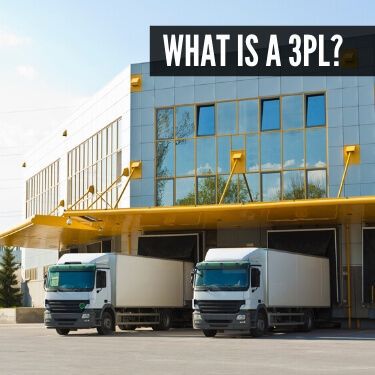
The services offered by 3PL firms include:
The global 3PL market today is a multi-billion dollar industry. More than four out of five Fortune 500 companies rely on some kind of third-party logistics company.
Companies need to ensure that the right consignment makes it aboard the correct carrier. They, therefore, hire freight brokers: people who match cargoes with trucks and guarantee they transport the correct goods. As their roles have developed, freight brokers have taken on additional tasks, such as freight authorization and coordinating transport and shipping across borders.
The duties and responsibilities of a freight broker include:
For many companies, therefore, a freight broker is an essential member of the team. It is somebody who understands the freight market inside out and always knows how to spot an opportunity to cut costs. During their professional lives, they save their employers hundreds of thousands of dollars on freight fees while ensuring that the entire operation goes smoothly. Training to become a freight broker includes things like tracking loads, factoring, dispatching, using broker software, and calculating freight rates.
Understanding the logistics market can be a massive challenge. With so many types of services on offer, it is difficult for representatives of a business who do not have experience in the industry to get services that deliver real value. Here’s where a freight forwarding company can help. A freight forwarder is somebody who negotiates on your behalf with carriers to make sure that whatever service you get is fit for purpose. Thus, their job is to understand the agenda of the logistics company and then negotiate terms of service that provides you with a beneficial outcome.
Companies often have to use multiple forms of transport to get their goods from one location to another. Transporting goods across international boundaries requires using a mix of air freight, ocean freight, road, and rail. Transferring cargoes between these different modes of transport, however, is fraught with challenges, especially when sending goods to another country.
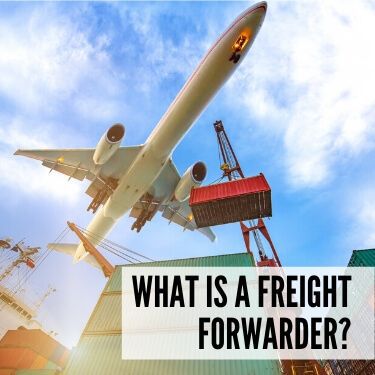
A freight forwarder - usually a 3PL company - specializes in connecting the dots between different transport methods, and reducing the administrative burden for the firm wanting to make the shipment. The job of the freight forwarder is to act as the middleman between transportation and shipping services, ensuring that they connect correctly and that the shipper gets the service that they need.
Some of the responsibilities of a freight forwarder include:
While adding a freight forwarder to the mix might sound like an additional expense, many firms rely on their services to ensure that their shipments arrive safely at their destinations, and on time. The purpose of freight forwarders is to make the process of shipping goods from one country to another less stressful. The forwarding company takes care of the entire liaison process for you, allowing your business to get on with what it does best: serve customers.
Whether there is a meaningful difference between a 3PL and a freight broker depends on how you define each. Freight brokers are intermediaries between shippers (that’s you) and carriers, negotiating with them on your behalf to ensure that you get a logistics service that meets your needs. 3PL, by contrast, are often “all-in-one” solutions that provide a wide range of services, including freight brokerage, among others.
3PL services try to add convenience to their customers by bringing the freight brokerage process “in-house.” Instead of, say, a manufacturer going to a freight broker who then approaches a logistics company on their behalf, 3PLs use their supply chain resources. Thus, in a sense, 3PLs are a freight brokering service - but they also offer a lot more.
For this reason, when you approach a third-party logistics firm, they already have the expertise and incentives in-house to provide you with a bespoke solution that fits your needs. Fundamentally, there’s no need to negotiate. You order the services you need a la carte.
As your company grows, so too do your logistics and distribution needs. Transporting goods from and to multiple locations is - for want of a better word - a logistical nightmare! The time will eventually come, therefore, when you’ll need to streamline. Knowing exactly when you need the help of a third-party provider, however, isn’t always obvious.
Below we list some of the telltale signs that you need a 3PL:

Eventually, the time will come when you have no choice but to seek the help of a 3PL - a company that can provide you with the resources to ensure that your business continues running smoothly, no matter how large it might grow. Most companies find that their costs rise exponentially if they try to do all their logistics in-house, and the quality of their service falls. The staff becomes overwhelmed, and the firm can’t muster the internal resources to stay on top of its shipping requirements. Handing things over to a 3PL often means that costs decline, and quality of service goes up, boosting the business brand. Thus, if you’re getting more complaints or seeing expenses rise, then it is likely high-time you made the switch.
While many firms choose to use 3PLs once they expand beyond a specific threshold, practically all companies in all verticals need a freight broker, right from the start. Firms need people with particular experience in shipping and handling to broker deals that guarantee that their products will arrive in the right place at the right time.
In general, companies choose to use the services of freight brokers early on - within the first few years of beginning operations. You may need to use their services if any of the following applies:
Suppose, for instance, that you’re worried you’re paying too much for logistics services, and it is damaging your competitiveness. A freight broker can evaluate your current agreement and tell you whether or not you’re onto a good thing. They use their insight to peel behind the curtain and ask the carrier some tough questions as to why they’re charging you so much. With a specialist on your side, you can often reduce the price of individual shipments or monthly fees.
Freight brokers are also adept at helping firms improve the reliability of their supply chains. If customers are becoming weary of late package deliveries, freight brokers can look for any logistics issues and fix them.
Finally, you may simply want to explore other options available on the market. In this case, a freight broker will rely on their experience to provide you with quality advice.
Whenever you’re in the market for a 3PL provider, your goal is always to reduce costs and improve efficiency. You’ll only achieve your aims, however, if you select a reputable firm. So how do you go about choosing a quality 3PL provider?

Choosing a 3PL isn’t always easy, but taking the time to investigate each option on the market can yield dividends. Ideally, you want a stable company that will be with you for the long haul that takes the time to get to know your business needs inside out.
Choosing a freight broker requires a similar process to selecting a 3PL. While it is not as critical as the latter, it is still vital.
Here are some of the factors you’ll need to consider:
When choosing a freight broker, it pays to do a little due diligence ahead of time. Fundamentally, you want to make sure that the individual or company that you choose as the experience and integrity to do the job properly. Try to avoid freight brokerage services with limited experience or lacking the proper accreditation.
3PL services are popular for a good reason: they offer a host of advantages over and above trying to organize your own logistics.
An often-overlooked benefit of 3PLs is that they offer ongoing industry expertise. These services stay up to date with industry best practices and implement new processes and technologies where possible to improve your supply chain. This aspect of the service saves their clients a lot of time and research effort, making for a more streamlined operation.
3PL services also offer scalability. Because most 3PL companies provide comprehensive services, they can adjust their resources to your needs. So, if you need more inventory space, more frequent shipments, and additional loading and unloading services, they can accommodate.
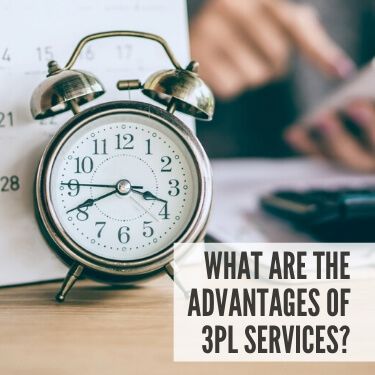
Finally, 3PL services help you save both time and money. No longer do you need to spend inordinate amounts of cash on providing your own warehousing or supply chain management. Most third-party logistics providers will simply negotiate with you and then settle on a monthly fee - often much lower than your current payments.
Just like 3PL service, freight brokers offer a variety of advantages - though they are perhaps not as extensive.
With a freight broker as a strategic partner, for instance, you can cut expenses. You no longer need a dedicated shipping department to organize your logistics - that’s all done for you by the third party.
Similarly, you get better information than you would if you tried to conduct regular freight operations. Brokers understand how the industry works inside out and know a good deal when they see one. Experienced professionals in this role also have excellent working relationships with individual carriers, often enabling them to negotiate rates down even further.
Finally, freight brokers lend your firm their expertise. You no longer need to spend your precious training budget on teaching members of your shipping department how to choose the best carriers. Instead, the third-party professional provides all of the insight you need upfront, without cost.
So, if both 3PL and freight carriers offer so many benefits, how do you choose between them?
Primarily, it depends on the nature of your operations. If you just need to move cargo from one point to another, then a freight broker will, in general, suffice. If, however, you need a more comprehensive service, a 3PL may better serve you.
Freight brokers specialize in finding transportation services that allow you to move goods via a variety of methods (such as by ocean or road), and they deal with both domestic and international administration. What they don’t usually offer, however, are means of storing and processing products. Their role is chiefly to facilitate a relationship between you and your carriers.
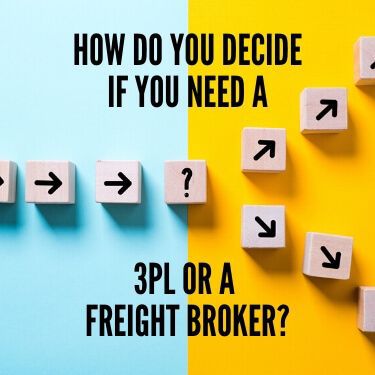
3PL companies, however, are different because they offer the full stack of services that you might need, including inventory management and warehousing. For that reason, they provide a complete service for growing enterprises.
Practically all firms require a freight broker to help them get the right carrier service. Companies that are expanding fast, however, may benefit from the flexibility and outsourcing offered by 3PLs even more.
The trick is to ask yourself what you need. If you need a basic intermediary between you and a carrier, then a freight broker will suffice. If you need anything above that, then the best bet is to choose 3PL.
Not knowing how freight brokers work is one of the chief reasons why more businesses don’t use their services. Freight brokers substantially reduce the costs involved in suitable carriers and taking advantage of their services.
But what functions does a freight broker actually perform on a day to day basis? Take a look at the process.
For international shipping, the process is a little more complicated, but you get the picture: freight brokers’ main job is to ensure that companies maintain their supply chains.
A 3PL operates in a similar way to a freight broker. It performs all of the checks outlined above, except that it does not manage interactions with a third-party carrier. Instead, it brings all quality control in-house.
Furthermore, because 3PLs have access to more resources and facilities, they can provide additional logistics functions, changing how they operate. So in addition to organizing all your shipping arrangements, 3PL services provide distribution, fulfillment, warehousing, inventory, parcel shipping, and returns management too. They also offer strategic advice for how your company might take advantage of the logistics options available to it in the future. These services could include multi-channel platforms, developing and managing online stores, and helping to improve your outsourcing mix.
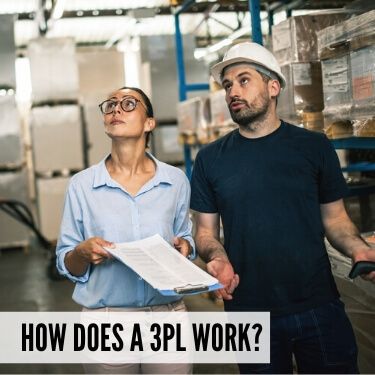
Working with a transportation provider can bring many benefits to your enterprise. The main advantage is the full suite of services that you get. When you sign up for 3PL, you can, for the first time, centralize all of your logistics and distribution through a single channel while getting a host of additional support that would be prohibitively costly to employ in-house.
Working with a transportation provider is just like working with a helpful partner. Logistics is not a hands-off outsourceable service like finance or marketing. It is something that is at the core of your business and requires a high level of cooperation between your team and the logistics firm.
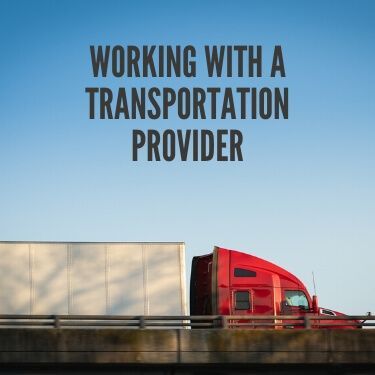
Quality 3PL companies and transportation providers know this, so they put systems in place right at the start of your working relationship to facilitate cooperation. The better you can each understand each other's needs and capabilities, the greater the partnership will be. Reps from the company will offer to meet with you periodically to discuss any new innovations in the industry and how they might help your enterprise. They’ll also make it clear how you can hold them accountable and provide you with regular updates on costs, losses, and delayed deliveries.
Because 3PL companies have a vast knowledge of logistics and distribution, they often make great strategic partners too. While they won’t know a great deal about the nitty-gritty details of your industry, they can provide you with critical advice in the realm of your supply chain. Often by merely working with a transportation provider, you can get access to massive savings you never thought possible, simply you are now aware of all the options.
Remember, when you work with a transportation company, they have a vested interest in your success. The happier your customers, the more orders you’re likely to receive, and the more work there will be for your provider. Many 3PL companies, therefore, work extremely hard on every front, doing their part to make sure that your business continues to grow. Planning and strategy are all worthwhile elements of the service because they give you insight into how you can lower costs and serve your customers better. When that happens, everyone wins.
So which is best in the battle of 3PL vs Freight Broker? It depends on your business needs. As your company grows, you might need to be able to outsource logistics to third-party entities that can scale their supply chain requirements in tandem with demand.
No matter whether you need a freight broker or 3PL, R+L Global Logistics has the services you need. We allow you to ship truckload freight all over the country, providing all of the ancillary services that you need to make it happen. Our team of professionals works closely with you, providing assistance, and ensuring that you make all your deliveries on time. What’s more, we work to help you build your company’s long-term strategic vision, helping you adapt to new business requirements as and when they arise.
Make the most of your shipping needs by exploring freight shipping routes. With lanes cross country from California to New York and everywhere in between, R+L Global Logistics is prepared to offer a high-quality logistics solution. Our large network of truckload shipping partners can offer many freight services, including:
So, what are you waiting for? Do you need comprehensive transportation services? Are you sick and tired of mismanaging your inventory? If so, then get in touch with us today to find out how R+L Global Logistics could benefit your enterprise. If you’re ready to get your goods on the road, get a freight quote today.
R+L Global Logistics
315 NE 14th St., Ocala, FL 34470